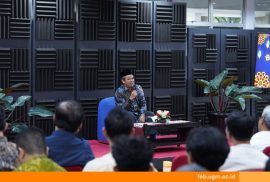Faculty of Economics and Business, Universitas Gadjah Mada (FEB UGM) in collaboration with PP KAEGAMA and PT Pupuk Kalimantan Timur held a seminar on Saturday (26/8). This seminar is part of the PKT-GAMA BCC 2023 series, which was held shortly before the Grand Final. At the seminar, PKT-GAMA BCC 2023 finalists and FEB UGM students were invited to study and discuss together to strengthen the sustainability of the agribusiness sector in the Learning Building on the 8th floor of FEB UGM.
Speech by the Dean of FEB UGM Prof. Dr. Didi Achjari, M.Com., Ak., CA. After that, Vice General Chair Family of Alumni of the Faculty of Economics and Business UGM (KAFEGAMA) and President Director of PT Saraswati Indoland, Dr. Bogat Agust Riyono, also delivered a speech. After a series of lectures, the event continued into the main session, namely a seminar moderated by Maya Lynn, who is the 2022 PKT-GAMA BCC Champion and MBA FEB UGM alumna. Maya introduced the two seminar speakers: Emilia Setyowati, Executive Secretary of Binaswadaya, and Poppy Ismalina, M.Ec.Dev., Ph.D., Associate Professor at the Department of Economics, FEB UGM.
The seminar began with a presentation by Dr. Poppy. Dr. Poppy started by describing the contribution of the agricultural sector. In economic terms, the agricultural sector contributes 12.91% of the national Gross Domestic Product (GDP). However, the agricultural sector contributed 2.4% to global agricultural emissions from 2015 to 2021. In essence, although agriculture plays a vital role in fulfilling Indonesia’s food security, this sector is also the cause of environmental destruction and worsening climate change. Dr. Poppy then explained in more detail the sources of emissions from agricultural activities. Facing this, Dr. Poppy emphasized the importance of decarbonizing agriculture through ESG-based financial and accountability reports and a net zero emission program targeted by Indonesia in 2060.
In the same seminar, Emilia explained the demographic condition of the Indonesian agricultural sector: 27.68 million agricultural households, but only 13.44% of farmers use the internet, and 47.29% of agricultural households use agricultural technology (SUTAS, 2018). In this case, agriculture in Indonesia is still far from implementing modern agriculture, so it has not been able to meet agricultural challenges both globally (food security, nutrition and sustainability) and nationally (agricultural institutions, strengthening human resources and agricultural research, strengthening production, increasing farmer welfare, as well as post-harvest and foreign trade distribution). Indonesian agriculture has great potential: starting from the largest biodiversity in the world, the share of Indonesia’s productive population is 70.27%, and the land area reaches 1.9 million km² and waters reach 6.5 million km², continued Emilia. So, in order to realize this, Indonesian agriculture requires a transformation of the food and agricultural system that is more innovative, competitive, resilient and sustainable. This can be accommodated through agricultural education and extension institutions, for example, Trubus Bina Swadaya.
Emilia’s presentation is certainly in line with Dr. Poppy’s previous presentation supporting sustainable development goals (SDGs) goals: 2 (no hunger), 12 (responsible production and consumption), 13 (climate action), and 17 (partnership for the goals). After the two presentations, the moderator opened a question and answer session, in which the finalists and seminar participants enthusiastically participated. The completion of the question and answer session ended this seminar, continuing with presentations and the 2023 PKT-GAMA BCC Grand Final.
Reportage: Hayfaza Nayottama
Watch the full video at https://www.youtube.com/live/kvnH_1LFQhM








